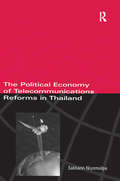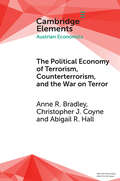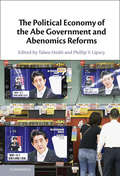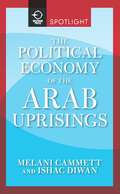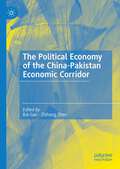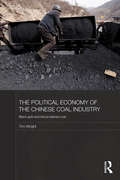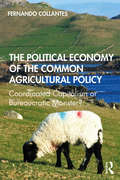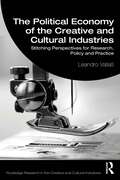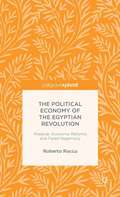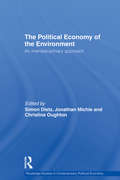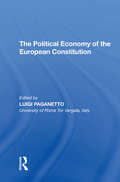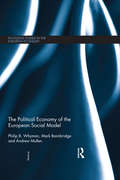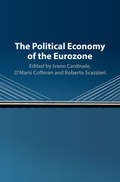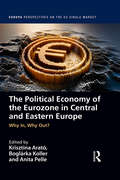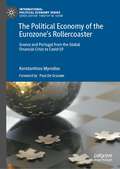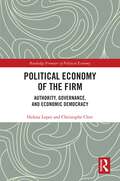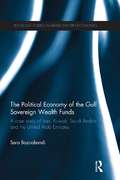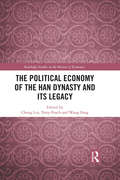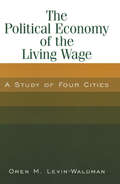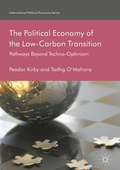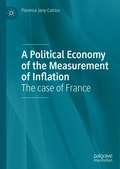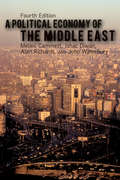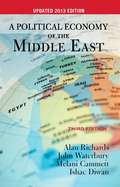- Table View
- List View
The Political Economy of Telecommunicatons Reforms in Thailand
by Sakkarin NiyomsilpaA study of the changing character of state-society relations in contemporary Thailand, using the telecommunications industry as a case study. It examines the privatization and gradual reforms of the 1980s and 1990s and the political dynamics behind these policies, as well as conflicts and co-operation among the various players and their interests. The book also covers bureaucratic and political corruption and their implications for Thailand's political democratization and economic liberalization. It argues not only that the bureaucracy is no longer the dominant power in Thai politics, but also that the country has moved towards a more pluralistic socio-political system in which a broadly-based liberalization coalition has emerged.
The Political Economy of Terrorism, Counterterrorism, and the War on Terror (Elements in Austrian Economics)
by Anne R. Bradley Christopher J. Coyne Abigail R. HallThis Element explores the topics of terrorism, counterterrorism, and the US government's war on terror following the September 11, 2001 terror attacks. It draw on insights from Austrian and public choice economics. First, the foundations of the economics of terrorism are discussed emphasizing that the behaviors of terrorists and counter-terrorists are purposeful and goal-oriented. Then, the economics of counterterrorism policies and the importance of institutional change is considered. Next, the three dilemmas facing liberal societies as it relates to counterterrorism efforts is focused on. The Element then provides an assessment of the US government's war on terror. It discusses the origins of the war, discuss whether it can be judged a success or failure, and consider some of the main effects both abroad and within the United States. The final chapter concludes with a discussion of several areas for future research.
The Political Economy of the Abe Government and Abenomics Reforms
by Takeo Hoshi Phillip Y. LipscyThis volume seeks to explain the political economy of the Abe government and the so-called 'Abenomics' economic policies. The Abe government represents a major turning point in postwar Japanese political economy. In 2019, Abe became the longest serving Prime Minister in Japanese history. Abe's government stood out not only for its longevity, but also for its policies. Abe came to power promising to reinvigorate Japan's economy under the banner of Abenomics. He pursed a host of structural reforms and industrial promotions to increase Japan's potential growth rate. Abe also achieved important legislative victories in security policy. However, the government also faced significant controversies. The book will hold appeal to scholars and students specializing in the study of Japanese politics, comparative political economy, the politics of contemporary advanced democracies, macroeconomic policy, labor market reforms, corporate governance, gender equality, agricultural reforms, energy and climate change, and East Asian security.
The Political Economy of the American Frontier
by Ilia MurtazashviliThis book offers an analytical explanation for the origins of and change in property institutions on the American frontier during the nineteenth century. Its scope is interdisciplinary, integrating insights from political science, economics, law and history. This book shows how claim clubs - informal governments established by squatters in each of the major frontier sectors of agriculture, mining, logging and ranching - substituted for the state as a source of private property institutions and how they changed the course of who received a legal title, and for what price, throughout the nineteenth century. Unlike existing analytical studies of the frontier that emphasize one or two sectors, this book considers all major sectors, as well as the relationship between informal and formal property institutions, while also proposing a novel theory of emergence and change in property institutions that provides a framework to interpret the complicated history of land laws in the United States.
The Political Economy of the Arab Uprisings
by Ishac Diwan Melani CammettIn this Westview Press Spotlight, Melani Cammett and Ishac Diwan explore the impact of the Arab Spring and subsequent events in the region. The Political Economy of the Arab Uprisings analyzes the ways in which salient socioeconomic and political factors are interacting to shape the construction of new political institutions and economic reform programs. The authors introduce students to events with vivid depictions of regional variations in the uprisings, pointing to a variety of factors that differentiate the countries of the region and help to explain their distinct trajectories thus far. The Political Economy of the Arab Uprisings is an extracted chapter from the 2013 Updated Edition of A Political Economy of the Middle East, Third Edition by Alan Richards, John Waterbury, Melani Cammett, and Ishac Diwan (ISBN 978-0-8133-4928-2). In the full-length edition, the authors present a comprehensive analysis of the transformation and development of the political economy in the Middle East over the past several decades. The book retains its focus on the interaction of economic development processes, state systems, and social actors as well as introduces coverage of the rising oil prices and how it reinforces authoritarian governance in the region, a refined assessment of "the Washington Consensus,” the impact of the Arab Spring, and much more.
The Political Economy of the Arab Uprisings
by Ishac Diwan Melani CammettIn this Westview Press Spotlight, Melani Cammett and Ishac Diwan explore the impact of the Arab Spring and subsequent events in the region. The Political Economy of the Arab Uprisings analyzes the ways in which salient socioeconomic and political factors are interacting to shape the construction of new political institutions and economic reform programs. The authors introduce students to events with vivid depictions of regional variations in the uprisings, pointing to a variety of factors that differentiate the countries of the region and help to explain their distinct trajectories thus far.The Political Economy of the Arab Uprisings is an extracted chapter from the 2013 Updated Edition of A Political Economy of the Middle East, Third Edition by Alan Richards, John Waterbury, Melani Cammett, and Ishac Diwan (ISBN 978-0-8133-4928-2). In the full-length edition, the authors present a comprehensive analysis of the transformation and development of the political economy in the Middle East over the past several decades. The book retains its focus on the interaction of economic development processes, state systems, and social actors as well as introduces coverage of the rising oil prices and how it reinforces authoritarian governance in the region, a refined assessment of "the Washington Consensus," the impact of the Arab Spring, and much more.
The Political Economy of the China-Pakistan Economic Corridor
by Bai Gao Zhihong ZhenThis book explores the political economy of China-Pakistan economic corridor, a major pilot project for China’s “One Belt, One Road” initiatives. Pakistan will provide China with not only a pathway access to the Indian Ocean, Middle East and Africa, but also vital connections to the Trans-Asia railway network that links Southeast Asia, South Asia and West Asia. This book analyzes how domestic factors in Pakistan will affect China’s $46 billion investments. It will be of interest to scholars, policymakers, and journalists.
The Political Economy of the Chinese Coal Industry: Black Gold and Blood-Stained Coal (Routledge Studies on the Chinese Economy)
by Tim WrightCoal mining is one of China’s largest industries, and provides an excellent case study through which to consider the broader issues of China’s transition from socialism to capitalism, focussing on the shift to a market economy, the rise of rural industry and the situation of China’s working class. Coal was one of the pillars of the planned economy but, the author argues, its shift to market-based operations has been protracted and difficult, particularly in moving from the artificially low prices of the planned economy to market prescribed prices - a change that had a major impact on the industry’s financial performance. The book goes on to considers the growth of small rural coal mines as part of the Township and Village Enterprises (TVEs) programme; these small mines have brought prosperity to areas where small manufacturing enterprises are not competitive, but at the same time have been the cause of many social and environmental problems. It also examines the situation of coal miners - arguably one the most vulnerable segments of the Chinese working class - under socialism and under capitalism, paying particular attention to the issue of work safety and coal mine disasters. The book provides a comprehensive and coherent treatment of these issues from the establishment of the People’s Republic up to 2010.
The Political Economy of the Common Agricultural Policy: Coordinated Capitalism or Bureaucratic Monster?
by Fernando CollantesWhat is the balance of the European Union’s Common Agricultural Policy more than half a century after its birth? Does it illustrate the virtues of the European model of coordinated capitalism, as opposed to US-style liberal capitalism? Or is it an incoherent set of instruments that exert diverse negative impacts and, like Frankenstein’s monster, seems to have escaped the control of its designers? The Political Economy of the Common Agricultural Policy does not criticize the CAP from the liberal standpoint that views most public interventions in the economy as bad for efficiency and welfare. The CAP has been costly to Europeans, both as consumers and as taxpayers, and has also generated a number of negative impacts upon third countries, but these costs and impacts have been more moderate than is suggested. This book proposes that the issue with the CAP is not a generic problem of coordinating capitalism but, instead, a more specific problem of low-quality coordination. The text argues that profound reform of the European Union’s institutions and policies is required to counter the rapid rise of a more Eurosceptical state of mind but – in the case of agricultural policy – history casts serious doubts on the capacity of the European network of agriculture-related politicians to lead such a reform. This key work is essential reading for researchers, graduate students, and master’s level docents of the Common Agricultural Policy and – more broadly – European Union policy and reform.
The Political Economy of the Creative and Cultural Industries: Stitching Perspectives for Research, Policy and Practice (Routledge Research in the Creative and Cultural Industries)
by Leandro ValiatiThe creative and cultural industries (CCIs) are often seen by markets as critical drivers of economic growth and by governments as feasible ways to foster development. The link between these two perspectives lies in the CCIs’ capacity to generate both economic value and social innovation simultaneously. While markets value their direct contribution to GDP and employment, governments recognise their potential to catalyse broader societal development through cultural expression, innovation and community engagement.Divided into key sections covering theoretical foundations, economic growth and development, innovation, policy and data analysis, this book presents a multifaceted view of CCIs’ role in modern economies and societies. It challenges traditional economic models, advocates for a holistic approach to socio‑economic development and examines the transformative impact of digital technologies on creative work. This work makes significant contributions to the field by advancing the political economy of CCIs, synthesising current debates and clarifying critical concepts. It explores innovative approaches to measuring the economic impact of CCIs and proposes a roadmap for harnessing their full potential in driving sustainable and inclusive growth. With its flexible structure allowing for customised learning experiences, this book is an essential resource for understanding the complexities of creative industries in our rapidly changing world.This interdisciplinary volume bridges theory and practice, providing invaluable insights relevant to students of CCIs, economics, arts and cultural management, as well as for academics, policymakers and practitioners.
The Political Economy of the Egyptian Revolution: Mubarak, Economic Reforms and Failed Hegemony
by Roberto RoccuFocusing on the economic reforms adopted under Mubarak, Roberto Roccu provides the first account of the deeper socio-economic dynamics that made the 2011 Egyptian revolution possible.
Political Economy of the Environment: An Interdisciplinary Approach (Routledge Studies In Contemporary Political Economy Ser.)
by Jonathan Michie Simon Dietz Christine OughtonThis book is the culmination of several years work by a group of academics, policy-makers and other professionals looking to understand how alternative economic thinking – and indeed thinking from quite different social-scientific disciplines – could enhance the mainstream economic approach to environmental and natural-resource problems. Of the editors, Dietz comes from the mainstream economics tradition, while Michie and Oughton draw explicitly on institutional and evolutionary economics. The various authors represent a range of disciplinary backgrounds and approaches. This book draws on the strengths of each and all of these approaches to analyse environmental issues and what can be done to tackle these through corporate and public policy. The book argues that the need for an inter-disciplinary approach. Two themes which emerge repeatedly throughout the book are the need for an interdisciplinary theory of technological change, and the need for a similarly interdisciplinary approach to the study of human behaviour and how it influences both production and consumption choices. The two themes are of course related. Resolving environmental questions requires an understanding of their nature, of their causes and, to the extent that they are anthropogenic, of how to change human behaviour. These fundamental issues are the focus of the four chapters that form Part 1 of this volume. The remainder of the volume develops them in more detail. .
The Political Economy of the European Constitution
by Luigi PaganettoThe enlargement process, the creation of the Monetary Union and the need to promote further the political and economic integration of Europe have ignited an intense debate at the European level among researchers and policy-makers. Examining the effects that political, legal, and regulatory institutions have on economic development, this book provides new contributions on the political economy of the European constitution. It covers many issues including social protection, fiscal reform and regional policies that are on the table of European policy makers. Furthermore, it provides ideas and analysis of such issues as the problem of voting reform, the centralization and decentralization of the policy process and the allocation of new policy prerogatives at the EU level which are crucial for the design of a new European constitution.
The Political Economy of the European Social Model (Routledge Studies In The European Economy Ser. #26)
by Philip B. Whyman Mark J. Baimbridge Andrew MullenThis book seeks to analyse the development of the European Union (EU), which was founded upon the principle of the free movement of capital, goods, services and people in 1957. Its central thesis is that, from a practical and theoretical point of view, such a basis is fundamentally at odds with the creation of an interventionist regime that the construction of a social Europe would require. The authors argue convincingly that - economically: the EU does not currently possess the budget or the economic tools to pursue such a strategy; politically: close to none of the institutions of the EU have backed such a policy; practically: conservative and neo-liberal forces (among member states and the institutions of the EU) have repeatedly thwarted any moves in this direction. In reality, the Single Internal Market, Economic and Monetary Union, enlargement, the Lisbon Agenda and European Constitution projects all prioritise supply-side measures and expanding the scope of the market rather than the boosting of demand and other economic intervention. Consequently, constructing a social Europe in the face of this would appear problematic. Hence, in both theory and practice, the idea that there can be a social Europe vis-à-vis neoliberalisation is a contradiction in terms. This controversial book will be an educating and refreshing read for advanced students and academics involved with European politics, the European Union, European Economics and Economic instititutions.
The Political Economy of the Eurozone
by Roberto Scazzieri D’maris Coffman Ivano CardinaleThe Eurozone is not a mere currency area. It is also a unique polity whose actors span multiple levels (supranational, national, regional, sectoral) and pursue overlapping economic and political objectives. Current thinking on the Eurozone relies on received categories that struggle to capture these constitutive features. This book addresses this analytical deficit by proposing a new approach to the political economy of the Eurozone, which captures economic and political interdependencies across different levels of decision making and sheds light on largely unexplored problems. The book explores the opportunities afforded by the structure of the Eurozone, and lays the foundations of a political economy that poses new questions and requires new answers. It provides categories that are firmly grounded in the existing configuration of the Eurozone, but are a precondition for overcoming the status quo in analysis and policy.
The Political Economy of the Eurozone in Central and Eastern Europe: Why In, Why Out? (Europa Perspectives on the EU Single Market)
by Krisztina AratóThe idea for this volume came from the enigma that some Central and Eastern European (CEE) European Union (EU) member states have been keen to join the Eurozone while others have shown persistent reluctance. Moreover, the attitudes towards joining have seemingly not correlated with either the level of economic development or the time spent as part of the EU, nor with any other rational reason such as the level of integration into the EU real economy, or the level of trust in the EU on the part of the public. Therefore, at first sight, the answer to the question ‘why in, why out?’ remains rather unclear. The attractiveness of the currency union has nevertheless not disappeared for the CEE countries. Despite the Eurozone crisis of 2010–13, it was during that time that the Baltic states introduced the euro. Then, after a few years of inactivity, Croatia and Bulgaria successfully applied for membership of the exchange rate mechanism in July 2020, amid the economic crisis caused by the coronavirus (COVID-19) pandemic. At the same time, the three Visegrad countries still using their national currencies – Poland, Czechia and Hungary – no longer have a target date to join the monetary union. This volume aims to discuss these issues from horizontal aspects and through country studies, with contributions from expert authors from, or closely related to, the CEE region.
The Political Economy of the Eurozone’s Rollercoaster: Greece and Portugal from the Global Financial Crisis to Covid-19 (International Political Economy Series)
by Konstantinos MyrodiasGlobal crises throughout history have shaken humanity and transformed economies and societies. The Eurozone faced two such crises soon after its foundation. This book brings new insights regarding the Eurozone’s response to the Global Financial Crisis in 2008 and the Covid-19 pandemic and its effectiveness in dealing with the macroeconomic imbalances in Europe. Is the Eurozone more resilient now? This book is an indispensable addition to the literature on the recent global crises and the Eurozone for both academics and policymakers who are eager to delve deeper into these vital questions.
Political Economy of the Firm: Authority, Governance, and Economic Democracy (Routledge Frontiers of Political Economy)
by Helena Lopes Christophe ClercAn alternative theory of the firm is needed that helps better understand the nature and actual functioning of firms as well as the challenges raised by digital platform firms. In defining firms as economic collective ventures organised by political means, this book offers a “political economy” vision of firms. Specifically, the book provides an authority-based conception of the firm that supplies a theoretical grounding for democratic governance. It is argued that workers must be viewed as actors of the firm, not passive subjects of capital, given that authority is a non-coercive form of power. The book examines authority and subordination from the workers’ perspective and argues that when workers accept authority, it is because they see it as facilitating mutually beneficial cooperation between people with divergent interests. As managerial authority is based on its acceptance by workers, it calls for legitimacy. Neither ownership nor the function that authority performs makes it legitimate. The book shows that legitimacy entails the democratisation of corporate governance, within the framework of “pluralistic companies”, and thus joins the many voices that increasingly question shareholder primacy. The book will be of great interest to researchers and students in economics and law as well as labour professionals, employers, unions, policymakers and anybody interested in economic democracy.
Political Economy of the Gulf Sovereign Wealth Funds: A Case Study of Iran, Kuwait, Saudi Arabia and the United Arab Emirates (Routledge Studies in Middle Eastern Economies)
by Sara BazoobandiUsing four Gulf sovereign wealth funds as case studies – Iran, Kuwait, Saudi Arabia and the UAE - this book examines and analyses the history, governance and structure, and investment strategies of the above mentioned funds, in the context of on-going debates about their transparency. The book discusses how most Gulf sovereign wealth funds were established under colonial rule, and have operated in the global financial system for many decades. With the increase of oil revenues, it goes on to look at how the funds have broadened their asset classes and their institutional development. Debate over the transparency of sovereign wealth funds has highlighted various global practices. Recently, organisational measures have been introduced for calculating possible risks from non-commercial investment incentives of funds, whose politically-driven investment strategies are viewed as potentially a major threat to the national security of their host countries. Highlighting a number of incidents that triggered the transparency debate, the book scrutinises the reaction of some of the Gulf sovereign wealth funds to these recent regulatory codes and strategies. It is a useful contribution to Development, Political Economy and Middle East Studies.
The Political Economy of the Han Dynasty and Its Legacy (Routledge Studies in the History of Economics)
by Cheng Lin Terry Peach Wang FangThis book contains original essays on various aspect of the Han’s political economy and its legacy, written by leading Chinese and Western scholars whose collective expertise spans Economic History, History of Economic Thought and Sinology.
The Political Economy of the Living Wage: A Study of Four Cities
by Oren M. Levin-WaldmanThis book examines the movement for living wages at the local level and what it tells us about urban politics. Oren M. Levin-Waldman studies the role that living wage campaigns may have had in recent years in altering the political landscape in four cities where they have been adopted: Los Angeles, Detroit, Baltimore, and New Orleans. It is the author's belief that the living wage movements are a result of policy failure at the local level. They are the by-product of the failure to adequately address the changes that were occurring, mainly the changing urban economic base and growing income inequality. The author undertakes a scholarly analysis of the issue through the disciplinary lenses of political science while also employing some of the economists' tools.
The Political Economy of the Low-Carbon Transition
by Peadar Kirby Tadhg O’mahonyThis book addresses the global need to transition to a low-carbon society and economy by 2050. The authors interrogate the dominant frames used for understanding this challenge and the predominant policy approaches for achieving it. Highlighting the techno-optimism that informs our current understanding and policy options, Kirby and O'Mahony draw on the lessons of international development to situate the transition within a political economy framework. Assisted by thinking on future scenarios, they critically examine the range of pathways being implemented by both developed and developing countries, identifying the prevailing forms of climate capitalism led by technology. Based on evidence that this is inadequate to achieve a low-carbon and sustainable society, the authors identify an alternative approach. This advance emerges from community initiatives, discussions on postcapitalism and debates about wellbeing and degrowth. The re-positioning of society and environment at the core of development can be labelled "ecosocialism" - a concept which must be tempered against the conditions created by Trumpism and Brexit.
A Political Economy of the Measurement of Inflation: The case of France
by Florence Jany-CatriceInflation should no longer be a politically sensitive indicator. Indeed, since the early 1980s, macroeconomic policies have managed to contain it. Yet the consumer price index (CPI), which is the main indicator for measuring inflation, remains very frequently consulted by citizens, due to its multiple uses. The CPI is used for indexing wages, pensions, but also various contracts such as food pensions. It is also used by National Accounts to deflate macroeconomic values and to provide data in “real” terms. But how is this CPI measured? index? What reforms have happened to give shape to the XXIst century CPI? This book presents the CPI based on the study of the controversies that have marked its history. Set in both the socio-economic and ideas contexts, these controversies show the eminently conventional and political nature of the CPI and, therefore, of many other macroeconomic indicators, such as growth or productivity.
Political Economy of the Middle East
by Melani Cammett Ishac Diwan Alan Richards John WaterburyA Political Economy of the Middle East is the most comprehensive analysis of the political economy of development in the contemporary Middle East over the past several decades, examining the interaction of economic development processes, state systems, state policies, and social actors in the Middle East. The fourth edition, with new authors Melani Cammett and Ishac Diwan, has been thoroughly revised, with two new introductory chapters that provide an updated framework with which to understand and study the many changes in demography, education, labor markets, urbanization, water and agriculture, and international labor migration in the recent years. The new edition also includes: a new chapter that charts the political economy of the Gulf states and in particular the phenomenal growth of oil economies; a new chapter on the growth of the private sector and its effects in the region; a new chapter on the rise of "crony capitalism;" and increased coverage of the changes in civil society and social movements in the region including an exploration of the causes, dynamics, consequences, and aftermath of the Arab uprisings.
A Political Economy of the Middle East
by Melani Cammett Ishac Diwan John Waterbury Alan RichardsThis integrated, analytic text presents a comprehensive analysis transformation and development of the political economy in the Middle East over the past several decades. In this updated third edition of A Political Economy of the Middle East, the book retains its focus on the interaction of economic development processes, state systems, and social actors even as it also:*Documents the many changes in demography, education, labor markets, urbanization, water and agriculture, and international labor migration in the Middle East in recent years;*Considers the effect of rising oil prices on reinforcement of authoritarian governance in the region;*Refines its assessment of "the Washington Consensus" to provide a more nuanced approach to the issue of the shifting balance of state and market in economic growth and reform;*Presents Islamism as a vital force in the region that is nonetheless a vast, diverse social movement with many conflicting participants;*Explores the impact of the Arab Spring and subsequent events to the issues raised throughout the textbook in a wholly new chapter.
